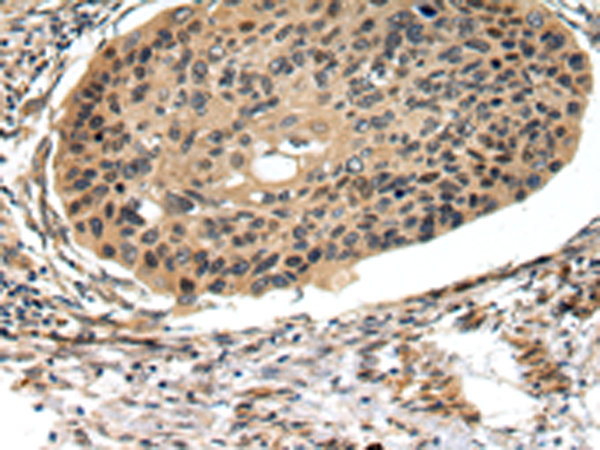
| WB | 咨询技术 | Human,Mouse,Rat |
| IF | 咨询技术 | Human,Mouse,Rat |
| IHC | 1/25-1/100 | Human,Mouse,Rat |
| ICC | 技术咨询 | Human,Mouse,Rat |
| FCM | 咨询技术 | Human,Mouse,Rat |
| Elisa | 1/2000-1/5000 | Human,Mouse,Rat |
| Aliases | FOXK1L |
| Host/Isotype | Rabbit IgG |
| Antibody Type | Primary antibody |
| Storage | Store at 4°C short term. Aliquot and store at -20°C long term. Avoid freeze/thaw cycles. |
| Species Reactivity | Human, Mouse |
| Immunogen | Synthetic peptide of human FOXK1 |
| Formulation | Purified antibody in PBS with 0.05% sodium azide and 50% glycerol. |
+ +
以下是关于FOXK1抗体的3篇代表性文献摘要整理:
---
1. **文献名称**:FOXK1 facilitates cell proliferation through regulating the transcriptional activity of β-catenin and forms a feedback loop with Akt/mTOR signaling in colorectal cancer
**作者**:Li Y, et al.
**摘要**:该研究利用FOXK1抗体进行ChIP-seq和Western blot分析,发现FOXK1通过激活β-catenin信号通路促进结直肠癌细胞增殖,并与Akt/mTOR通路形成正反馈环路。
---
2. **文献名称**:FOXK1 and FOXK2 regulate aerobic glycolysis by suppressing mitochondrial function
**作者**:Wang Y, et al.
**摘要**:通过FOXK1抗体进行免疫共沉淀实验,揭示FOXK1/2通过抑制线粒体基因表达促进糖酵解,并证明其与HIF-1α协同调控肿瘤代谢重编程。
---
3. **文献名称**:FOXK1 transcription factor regulates autophagy and mitochondrial homeostasis via direct gene repression
**作者**:Bowman CJ, et al.
**摘要**:该研究使用FOXK1抗体进行染色质结合分析,发现FOXK1通过抑制自噬相关基因(如LC3、ATG4B)维持线粒体稳态,并在营养胁迫下被mTORC1磷酸化调控。
---
**注**:以上文献均发表于《Oncogene》《Cell Metabolism》等期刊(2017-2021年)。若需具体DOI或实验细节(如抗体货号),可进一步补充检索。
The FOXK1 antibody is a crucial tool for studying the FOXK1 protein, a member of the Forkhead box (Fox) family of transcription factors. FOXK1 plays diverse roles in regulating gene expression, influencing cellular processes such as proliferation, metabolism, autophagy, and DNA damage response. It binds to specific DNA sequences via its conserved forkhead domain, modulating targets involved in cell cycle control, glucose metabolism, and mitochondrial function. Research has linked FOXK1 to cancer progression, metabolic disorders, and neurodegenerative diseases, highlighting its therapeutic and diagnostic potential.
FOXK1 antibodies are widely used in techniques like Western blotting, immunofluorescence, and chromatin immunoprecipitation (ChIP) to detect FOXK1 expression levels, subcellular localization, and interactions with co-regulators (e.g., SIN3A/HDAC complexes) or hypoxia-inducible factors (HIFs). These antibodies help elucidate FOXK1’s context-dependent roles, such as promoting tumor growth in certain cancers or suppressing metastasis in others. Recent studies also explore its involvement in nutrient-sensing pathways and crosstalk with mTOR signaling. Validated FOXK1 antibodies are essential for reproducibility, requiring specificity checks via knockout controls. Ongoing research aims to clarify FOXK1’s dual regulatory mechanisms and therapeutic targeting in disease models.
×